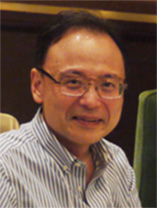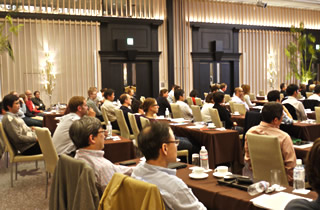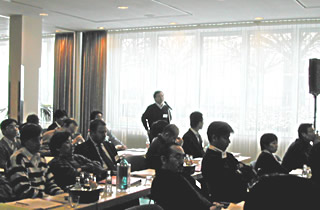お問い合わせ先
Research Cooperation Division I,
International Program Department,
Japan Society for the Promotion of Science (JSPS)
5-3-1 Kojimachi, Chiyoda-ku, Tokyo 102-0083, JAPAN
TEL
+81-3-3263-1944
TEL
fos*jsps.go.jp
Note: Please replace*with @.

 |
Yoshimichi Sato Past Participations in FoS:
|
|---|
My experience with JSPS’s Frontiers of Science (FoS) program started with the 5th Japanese-American FoS, in which I served as a Planning Group Member (PGM). After that, I also served as a PGM for the 6th JAFoS and for the 1st and 2nd Japanese-German FoS. Having participated in four FoS symposiums, I found myself completely enamored by the program. I am now a member of the JSPS FoS Symposium Advisory Board. What I find most fascinating about the FoS program is that it provides the participating researchers an opportunity to interact across both borders and disciplines. I can’t think of any other venue that tasks frontline researchers in diverse scientific fields, including the social sciences, to communicate their cutting-edge research in a way that makes it easy for everyone regardless of specialty to understand, while giving the participants abundant opportunity to engage in face-to-face discussions with the front-running researchers. As the participants lodge together over the course of the symposium, they are also given ample time to talk and interact with each other after the sessions. Every time I participate in a FoS symposium, I am intellectually so stimulated that my brain feels overheated. In other words, I am a “FoS addict.”
The research presented is, above all, incredibly interesting. Take one example: At the 10th JGFoS held in Kyoto this November, there was a session on imaging the movement of molecules. Whether or not the presentation had practicable application didn’t matter to me; it was just fun to watch the molecules move about like humans and robots and to witness the glee with which the speaker put on the demonstration for us. The session reminded me of how fun research can be and rewarding it is to be a researcher myself.
As I am a sociologist, the knowledge of the natural sciences that I gain from FoS symposiums is not always directly applicable to my own research. Nevertheless, these symposiums are very helpful to me as a researcher in other ways: They help to hone my skill in leading discussions and drawing meanings from them, while exposing me to various innovative presentation approaches. If it weren’t for the FoS program I may have remained sequestered within the sociology community. Instead, I’ve been greatly stimulated by the opportunity to communicate with frontline researchers in a variety of fields.
As a PGM, I have been asked to take on some challenging tasks. In the 5th JAFoS, I was asked to set up that FoS’s first social science session. I also tackled the challenge of putting together the very first JGFoS symposium. At first I was in a haze as to how to proceed. With the help of other PGMs on the Japanese, US and German sides and with the ideas and inspiration I garnered from repeated discussions with them, the fog melted into a clear vision of the path ahead. I later put the time and energy I had devoted to this process to work in building from scratch an international research and education hub under the JSPS’s 21st Century COE and the Global COE Programs.
I greatly appreciate these opportunities given to me by JSPS, Japan’s core research funding agency. In Japan, there is no other organization capable of implementing FoS symposiums on an equal footing with the National Academy of Sciences in the US and the Alexander von Humboldt Foundation in Germany. JSPS also has the advantage of possessing information on young researchers through its fellowship and university-support programs. It was hard for me as a PGM in the social science session to search and find excellent young participants across a wide range of related fields. I was able to do so thanks to the assistance accorded me by JSPS.
Currently, I am mainly helping with JGFoS symposiums as a member of the JSPS FoS Advisory Board. As I mentioned, the advantage offered by FoS symposiums is the opportunity they give everyone to spar vigorously in a discussion arena that crisscrosses a spectrum of scientific fields and disciplines, which is unprecedented in conventional academic conferences. Whenever I join an FoS symposium, I have difficulty holding back my temptation to lie about my age and jump into the discussions. Actually, I did allow myself to dive in at a JGFoS symposium a few years ago. (I can recall a JSPS official whispering in my ear afterwards.) The FoS program gives all of its participants a chance to take a leap across their own small research fields and into the big ocean of science. I highly recommend that young researchers who have the confidence to take that daring leap participate in a FoS symposium.
 |
 |
|
|
10th JGFoS Listening to the symposium as a committee member (middle) |
1st JGFoS Asking questions |